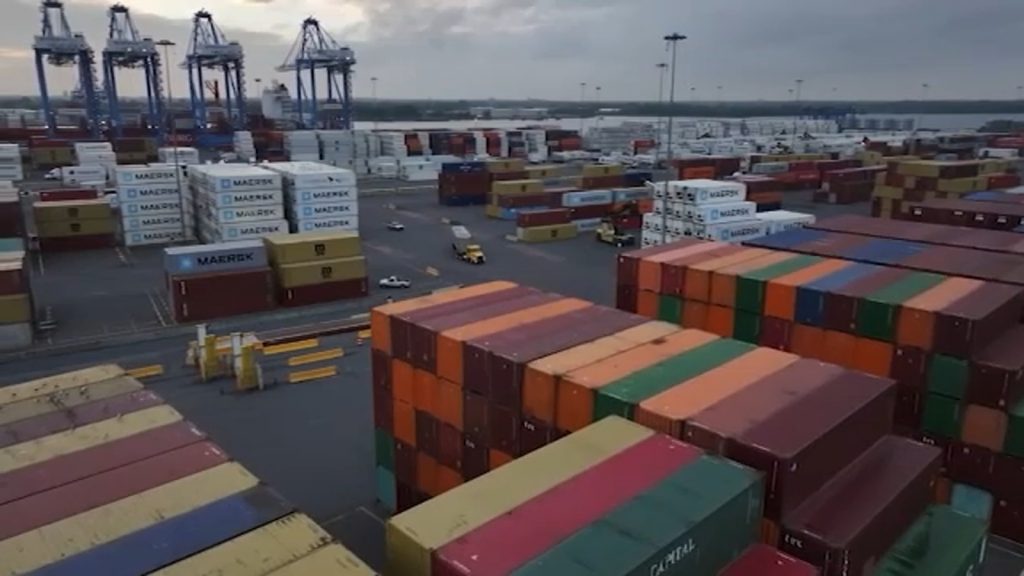A historic United States port strike has been suspended and a tentative agreement was reached “on wages,” according to the International Longshoremen’s Association and the U.S. Maritime Alliance.
“Effective immediately, all current job actions will cease and all work covered by the Master Contract will resume,” the ILA and USMX said in a joint statement Thursday evening.
The tentative agreement would increase workers’ wages by 62% over the life of the 6-year contract, sources familiar confirm to ABC News.
RELATED: Expert says don’t panic buy as dockworkers vow to stay on picket line
This represents a significant increase from the shipping industry group’s offer of a 50% wage increase earlier this week. The union had been pushing for a 77% pay hike over six years.
The tentative agreement would bring the hourly wage for a top dockworker to $63 per hour at the end of the new contract, up from $39 per hour under the expired contract.
The Maritime Alliance increased its offer amid public pressure from the Biden administration to put forward a contract offering higher wages.
The tentative agreement does not resolve differences between the union and shipping companies over the use of automated machinery, sources said. That will be a key focus of negotiations between both sides from now until January 15.
“I want to applaud the International Longshoremen’s Association (ILA) and the United States Maritime Alliance for coming together to reopen the East Coast and Gulf ports. Today’s tentative agreement on a record wage and an extension of the collective bargaining process represents critical progress towards a strong contract,” President Joe Biden said on the agreement.
RELATED: Dockworkers go on strike at Easern and Gulf ports | What to know
“I want to thank the union workers, the carriers, and the port operators for acting patriotically to reopen our ports and ensure the availability of critical supplies for Hurricane Helene recovery and rebuilding. Collective bargaining works, and it is critical to building a stronger economy from the middle out and the bottom up,” he continued.
Tens of thousands of U.S. dockworkers had walked off the job early Tuesday morning, clogging dozens of ports along the East and Gulf coasts.
ILA members started to set up picket lines at shipping ports up and down the Atlantic and Gulf coasts as of 12:01 a.m. Tuesday in the union’s first coastwide strike in nearly 50 years.
The ILA, the union representing 50,000 East Coast and Gulf Coast dockworkers under the contract at issue, was seeking higher wages and a ban on the use of some automated equipment.
“ILA longshore workers deserve to be compensated for the important work they do keeping American commerce moving and growing,” the ILA told ABC News in a statement on Monday. “Meanwhile, ILA dedicated longshore workers continue to be crippled by inflation due to USMX’s unfair wage packages.”
Following the strike, President Joe Biden called for a fair offer from the USMX an organization bargaining on behalf of the dockworkers’ employers. In a statement released on Tuesday, Biden emphasized the strong profits enjoyed by shipping firms in recent years, as well as the sacrifices made by dockworkers during the COVID-19 pandemic.
Amid the strike, USMX said Wednesday it remained “committed to bargaining in good faith to address the ILA’s demands and USMX’s concerns.”
A prolonged work stoppage of several weeks or months could have rekindled inflation for some goods and triggered layoffs at manufacturers as raw materials dried up, experts said.
The last time East Coast and Gulf Coast workers went on strike, in 1977, the work stoppage lasted seven weeks.
In 2002, a strike among workers at West Coast ports lasted 11 days before then-President George W. Bush invoked the Taft-Hartley Act and ended the standoff.
Copyright © 2024 ABC News Internet Ventures.


